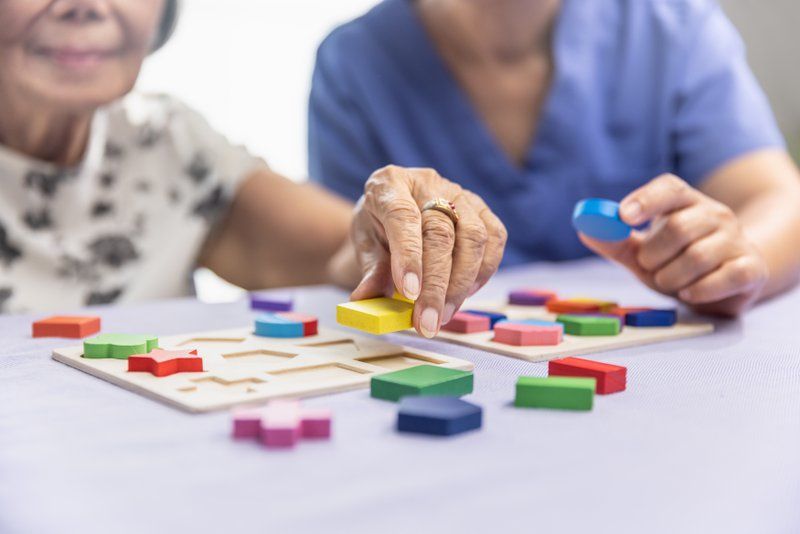BLOG
Beyond Alzheimer's: Understanding the Unique Challenges of Lewy Body Disease Care
As we explore the domain of memory care and assisted living, it's clear that the spectrum of care encompasses much more than Alzheimer's disease alone. This article aims to uncover the unique challenges of caring for those with Lewy body disease, especially focusing on the common and impactful experience of sensory hallucinations.
We're here to illuminate the complex care needs specific to this condition, offering essential insights for caregivers, professionals, and families on this journey. Join us as we explore the multifaceted nature of care for individuals grappling with this condition, offering practical perspectives and innovative strategies to enhance their quality of life.
Navigating Fluctuating Cognition: A Caregiver's Dilemma
When looking at Lewy body disease care, the impact of fluctuating cognition on care strategies cannot be overstated. Caregivers are confronted with the formidable challenge of providing consistent and effective support in the face of cognitive fluctuations, necessitating tailored approaches to address this complex dilemma.

Caregivers must adapt to the ever-changing cognitive states of individuals with Lewy body disease, requiring a dynamic and flexible approach to care. This involves not only understanding the cognitive fluctuations but also being prepared to adjust care strategies accordingly.
Caregivers face the dilemma of balancing the need for structured routines with the flexibility to accommodate cognitive fluctuations. The challenges of fluctuating cognition underscore the importance of personalized care plans that can adapt to the individual's changing needs.Tailored approaches may involve creating a supportive environment that minimizes stressors and triggers, thereby promoting stability amidst cognitive fluctuations.
The caregiver's dilemma in navigating fluctuating cognition calls for a nuanced understanding of the individual's unique cognitive patterns and the implementation of adaptable care strategies to provide consistent and effective support.
Understanding REM Sleep Behavior Disorder in Lewy Body Disease Care Management
The role of REM sleep behavior disorder (RBD) is a critical aspect that demands attention. This disorder significantly impacts sleep patterns and overall well-being, necessitating a comprehensive approach to care to address its implications.
RBD manifests as a disruption of the normal sleep cycle, often leading to vivid and sometimes physically active dreams during REM sleep. Caregivers and healthcare professionals must recognize the potential risks associated with RBD, including the possibility of injury during sleep-related activities. Addressing RBD in care management involves creating a safe sleep environment to mitigate the risk of injury during episodes of dream enactment.
The implications of REM sleep behavior disorder underscore the need for a holistic approach that encompasses not only waking hours but also the sleep environment and patterns. By understanding and addressing the challenges posed by RBD, caregivers and professionals can enhance the overall quality of care for individuals grappling with Lewy body disease.
Innovative Approaches: Enhancing Quality of Life in Lewy Body Disease Care
Innovative strategies and interventions play a pivotal role in enhancing the quality of life for individuals grappling with this condition. These emerging approaches are reshaping the care, offering new avenues to improve the well-being of those affected.

Virtual reality programs have shown promise in providing immersive experiences that stimulate cognitive function and emotional well-being, offering a novel approach to engage and uplift individuals with Lewy body disease. Personalized care initiatives tailored to the unique needs and preferences of each individual are instrumental in fostering a sense of autonomy and purpose, thereby enhancing their overall quality of life.
Innovative sensory stimulation techniques, such as music therapy and aromatherapy, have demonstrated positive effects in promoting relaxation, reducing anxiety, and improving mood among individuals with Lewy body disease.
By embracing these innovative approaches, caregivers and professionals can significantly impact the quality of life for individuals with Lewy body disease, offering them opportunities for meaningful engagement, emotional enrichment, and a sense of fulfillment.
Empowering Caregivers: Holistic Support for Families and Professionals
The holistic support required for caregivers, whether they are family members or professionals, is paramount. This section underscores the need for comprehensive resources, education, and emotional support to empower caregivers in navigating the complexities of providing care for individuals with Lewy body disease.
Comprehensive resources encompassing informational materials, support networks, and access to specialized care professionals are essential in equipping caregivers with the knowledge and tools necessary to provide effective care. Ongoing education and training programs tailored to the unique challenges of Lewy body disease offer caregivers the opportunity to enhance their skills and understanding, ultimately improving the quality of care they provide.
Emotional support, including counseling services and peer support groups, plays a crucial role in bolstering the well-being of caregivers, mitigating the emotional toll associated with providing care for individuals with Lewy body disease. By addressing the multifaceted needs of caregivers through holistic support, we can empower them to navigate the complexities of Lewy body disease care with confidence, compassion, and resilience.
Lewy body disease care presents multifaceted challenges that demand a nuanced and comprehensive approach. From navigating fluctuating cognition to addressing REM sleep behavior disorder and embracing innovative strategies, the care for individuals with Lewy body disease requires tailored, holistic support. Empowering caregivers with the necessary resources, education, and emotional backing is pivotal in ensuring the well-being of both the individuals with Lewy body disease and those who provide care.
For more information and resources on specialized memory care and assisted living services, we encourage you to visit https://www.assuredassistedliving.com/.
Let us tell you more. Contact us today, or download our free Family Decision Toolkit guide for more information.















